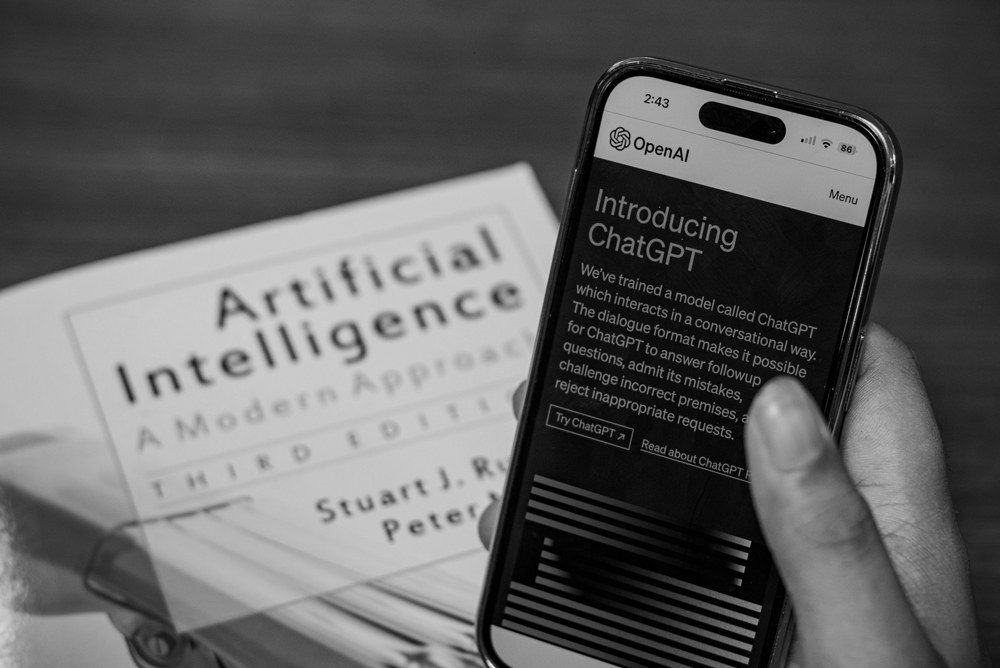In the current digital era, starting a business with the use of AI is becoming more and more common. Businesses may use AI technology to automate repetitive activities, reduce human error, and make quicker, more informed decisions. The application of AI business tools can result in higher productivity, financial savings, and better customer experiences.
An AI strategy needs to be well thought out and implemented in order to be successful. The actions listed below will walk you through each phase of starting a business and the tools that you can use for each one.
Step 1: Choose a Business Idea
When starting a business, choosing the right business idea is a crucial step towards success. To ensure that your niche aligns with your skills, experience, and passions, while also filling a gap in the market, it is important to have a strong and viable business idea. Fortunately, there are several AI business tools available to assist with this process. These tools include AI-powered market research tools that gather data on market trends and consumer behavior, as well as AI-powered brainstorming tools that generate and evaluate business ideas based on your criteria. By utilizing these tools, you can improve your chances of selecting a feasible business idea with potential for success.
Here are five AI business tools that can help you in choosing a business idea to pursue:
• IBM Watson Studio. This is a powerful AI business tool that can help you perform advanced data analysis to identify trends and insights in your industry. By using Watson Studio, you can make data-driven decisions when choosing a business idea.
• Google Trends. This is a free AI-powered tool that allows you to track the popularity of specific search terms and topics over time. By analyzing this data, you can identify trends and insights that can help you choose a business idea that has the potential for growth.
• IdeaScale. IdeaScale is a crowdsourcing platform that uses AI to help businesses generate and evaluate new ideas. It allows you to create custom challenges and invite your employees or customers to submit their ideas. AI algorithms then help you evaluate and prioritize the best ideas.
• MindMeister. MindMeister is a collaborative mind-mapping tool that can help you brainstorm and organize your business ideas. It uses AI technology to help you generate new ideas and create visual maps that can help you better understand and analyze your ideas.
• Validatorai.com. Receive feedback on your business idea with this AI tool, refining your concept before bringing it to life.
Step 2: Research your Product and Audience
To ensure the viability of your business or product idea, thorough research is essential to determine the existence of a target audience. This requires knowledge about your target market. To assist in this process, there are several AI-powered market research tools currently available:
• Poll the People. Poll the People is a market research tool powered by OpenAI that utilizes both AI and human intelligence to facilitate efficient and effective data analysis. The tool offers a range of analysis features, including AI-driven word clouds, audience demographics, and data analysis, to determine which designs best resonate with users.
• Appen. Appen is a market research tool powered by OpenAI that provides data annotation and collection services to support market research. The platform utilizes AI and machine learning algorithms to automate certain tasks, such as data categorization and sentiment analysis, and employs a global workforce of human annotators for other tasks, such as transcription services.
• Pecan. Pecan is a market research tool powered by OpenAI that offers automated analysis and insights for market research. The platform’s AI-powered analysis delivers actionable insights and recommendations to improve businesses’ products, services, and customer experience. Pecan’s essential features comprise sentiment analysis, topic modeling, intent analysis, and summarization.
• Ramesh. Remesh is a market research tool powered by AI that leverages natural language processing (NLP) to enable real-time conversations between businesses and their customers or stakeholders. The tool’s conversational AI platform permits businesses to interact with significant numbers of participants simultaneously, offering a cost-effective and efficient approach to gather genuine customer insights and feedback.
Step 3: Write a Business Plan
A business plan is crucial for managing essential aspects of your business. It encompasses various components, from your executive summary to your financials. The following are some of the most useful AI business tools for producing text for your business plan.
• LivePlan. This is a popular business planning software that uses AI technology to help you create a comprehensive business plan. It provides step-by-step guidance on creating a professional plan, including financial forecasts and market analysis.
• Enloop. Enloop is an AI-powered business plan software that automatically generates financial projections for your business. It also provides a scoring system that can help you evaluate the viability of your business idea and make adjustments as needed.
• Grammarly. Grammarly is a cloud-based writing assistant from the United States. It checks for errors in spelling, grammar, punctuation, clarity, engagement, and delivery in English text, identifies plagiarism, and proposes alternative word choices for detected mistakes. Additionally, it provides users with the ability to personalize their writing style, tone, and language that is specific to their context.
• ChatGPT. As a language model, ChatGPT can be a valuable tool in writing a business plan. With its advanced natural language processing capabilities, ChatGPT can help entrepreneurs create a clear and concise executive summary, develop a detailed market analysis, and articulate a comprehensive marketing and sales strategy. ChatGPT can also assist in financial forecasting and modeling, as well as providing suggestions and feedback on the overall structure and presentation of the plan.
While these AI business tools can significantly accelerate your creative thinking and production process, it is essential to recognize that a substantial amount of human involvement is still necessary for refining your business ideas and effectively communicating your message. This ensures that your ideas are distinctive and accurately reflected in your writing.

Step 4: Develop Your Brand and Branding Collateral
Developing a strong brand is a critical aspect of building customer trust and establishing a unique identity in the market. This process involves identifying the unique characteristics of your business and creating graphics and content that reflect those traits.
To help businesses and entrepreneurs with branding and marketing needs, numerous AI-powered branding tools have emerged online. These tools aid in brand ideation and development, and here are some of the most popular AI branding tools available today:
• Jasper.ai. Jasper.ai is an AI-powered art and writing tool that can quickly generate unique images and text based on user inputs. It offers high-quality 2k images with unlimited generations, commercial use, and no watermark. Jasper.ai’s AI writing tool can also assist in improving writing quality and generating content.
• Designs.ai. Designs.ai is an online design software that aims to make design more accessible to everyone. This AI business tool offers various design features such as logo maker, graphics editor, video editor, mockup generator, and speechwriting tool. With over 20,000 templates and 10,000 icons available, you can easily create designs that suit your needs.
• Adobe Sensei. Adobe Sensei is an AI-powered software that uses machine learning algorithms to enhance creative assets, streamline business operations, and provide valuable marketing insights. By using Adobe Sensei, businesses can improve their creative workflow and create high-quality graphics that automatically adjust to different screen sizes and resolutions. The software also features performance forecasting, which predicts future performance and helps businesses optimize their campaign strategies for better results.
• Khroma. Khroma is a revolutionary AI-powered color combination tool that utilizes your preferred color choices and thousands of pre-existing color palettes to create personalized and aesthetically pleasing color schemes. By selecting 50 colors from the Khroma website, the platform generates an array of unique and eye-catching color combinations.
• Naming Magic. Generate business names and domain ideas with AI assistance, ensuring your brand stands out.
• MakeLogo.ai. Makelogo.ai is an AI-powered online logo maker that helps users create custom logos for their businesses. This AI business tool offers a wide range of customizable logo templates, icons, and fonts to choose from.
• Looka.com. Looka is an AI-powered design platform that allows businesses and individuals to create professional logos and branding materials. Users can enter their business name, select their industry, and choose a few design preferences, after which Looka’s AI algorithms generate multiple logo options.
• StockImg.ai. Stockimg.ai is an AI-powered image search engine that provides access to millions of high-quality, royalty-free images. It uses advanced computer vision technology to analyze and categorize images, making it easy to find the perfect image for any project. The platform offers a variety of search filters, including color, size, orientation, and category, to help users quickly find the images they need.
• Mokker.ai. Mokker.ai is an AI-powered design tool that allows users to generate unique and customizable logos, branding materials, and social media posts. Mokker.ai offers various design templates and tools to customize designs, including color schemes, typography, and graphics.
• Synthesia.io. Synthesia is an AI-powered video creation platform that allows users to create personalized videos using computer-generated voiceovers that mimic human speech. It offers a variety of pre-made video templates and the ability to customize colors, fonts, and imagery.
• Lumen5.com. Lumen5 is an AI-powered video creation platform that transforms text into engaging videos. Its technology allows users to easily create professional-quality videos by using a combination of intelligent text-to-video technology and human editors. The platform offers customizable templates, images, and audio tracks to help users create videos that match their brand identity.
• Midjourney.com. Midjourney is an artificial intelligence service and program developed and hosted by a San Francisco-based independent research laboratory called Midjourney, Inc. The program can generate images from natural language descriptions, also referred to as “prompts,” which is similar to Stable Diffusion and OpenAI’s DALL-E.
• DiffusionBee.com. DiffusionBee is an AI-based image editor that can be used to enhance and edit photos with ease. Its smart features include facial recognition, skin smoothing, and color grading, allowing users to create stunning images in a matter of minutes.
• Murf.ai. Murf.ai is a platform that uses AI to automate video editing. Users can upload their raw footage and the software automatically edits it into a professionally produced video with music and transitions, saving users time and effort.
• Listnr.tech. Listnr is an all-in-one podcasting solution to help you record, edit, distribute, and monetize your podcast on one platform.
• Logo.ai. LogoAI is a brand-building platform that can help you create professional logos, design matching identities, and automate brand promotion with on-brand social media content.
Step 5: Build a Website using AI business tools
In this digital age, having presence online is not just beneficial – it is essential, and it all starts with having a website. A website lets you introduce your business to the world, and it is where potential customers can familiarize themselves to your brand and offerings. With that said, here are some AI business tools that can help you get a website up and running as quickly and cost-effectively as possible.

• Hostinger AI Builder. Hostinger AI Builder is part of Hostinger Website Builder, which is an all-in-one solution for building professional-looking websites. With the Hostinger AI Builder, you can simply describe your brand in a few words and the type of website you need. In minutes, the AI Builder will create a new template with unique content, images, and features that fit the description.
• Wix ADI. Wix Artificial Design Intelligence (ADI) allows entrepreneurs and startups to generate a fully-designed website within minutes. It will ask you what website to build and which features to include, such as forms, commenting, or live chat. Then, choose a theme, pick a homepage design, and add new pages. Users can customize the generated design and launch the site directly on the editor screen.
• Jimdo Dolphin. Jimdo Dolphin is an AI-powered version of the Jimdo website builder. It is faster and easier to set up, and lets you create a fully-customized, multi-page website for free. To make a new website, users need to describe their goals, project, and preferred color scheme. It will generate two different templates based on the information.
• Durable. Durable is one more excellent option for creating a simple site within minutes. All you need to do is answer two questions, and it will generate a website template. In addition to the design, this AI website builder automatically features elements like contact forms and social media buttons. You can customize each section manually to better fit your needs. Durable also offers AI content generator tools to help speed up the website development process.
• Uizard. Uizard is an AI-powered design tool that enables users to create professional-looking websites, desktop interfaces, and mobile apps in a matter of seconds. With Uizard, you can easily convert your hand-drawn sketches into a prototype and use them in your projects.
Step 6: Manage Your Finances
Getting a grip on finances is important for streamlining your business operations. After all, the profitability of your business relies on its ability to reduce costs while maximising revenue. That is why it is important to have accounting software that can help you get all your financial matters in order.
Here are a few AI business tools to help you power up your accounting and get the most value out of every penny you make:
• QuickBooks. QuickBooks is a popular accounting software that uses AI technology to help automate bookkeeping tasks. It can assist with tasks such as categorizing expenses, tracking invoices and payments, and generating financial reports.
• Xero. Xero is another popular accounting software that uses AI technology to help streamline accounting processes. It includes features such as bank reconciliations, expense management, and invoicing, all of which can be automated using AI technology.
• Sage Intacct. Sage Intacct is a cloud-based accounting software that uses AI to automate accounting processes and provide real-time financial insights. It includes features such as accounts payable and receivable management, budgeting and forecasting, and financial reporting.
Step 7: Market your Business
A successful business launch requires marketing. It is essential because it helps entrepreneurs to increase awareness of their goods and services and generate interest among potential customers.
Listed below are a few AI business tools to help you launch your marketing campaign:
• Flick. Flick AI Social Media Assistant is a powerful marketing tool designed to streamline the brainstorming, writing, and planning process for social media content. Built specifically for social media, this tool offers 24/7 support and an easy setup process. It is trusted by over 100,000 content creators, brands, and marketers, helping them save time, improve results, and enhance their social media presence.
• GrowthBar. GrowthBar uses GPT-3 AI to automate content generation. It can suggest keywords, exact word count, links, images, and more. The tool can provide extensive backlinking as well as creating blog post content outlines.
• Phrasee. Phrasee is an AI tool that focuses on “brand language optimization.” This AI-powered marketing platform works by boosting the brand language used by companies in their copies. It can generate a copy for emails, Instagram, Facebook, or even push notifications using a natural language generation system with a machine learning algorithm. The result is a human-sounding copy that is brand compliant and effective.
• Smartwriter.ai. Smartwriter.ai assists in automating your email outreach. This AI tool generates a personalized email, including a personal subject line, to pique the interest of customers. It also provides backlink generation, Shopify product title and description creation, and even personalized cold email outreach. It also allows integration with third-party tools and platforms to improve your cold email outreach process.
• Optimove. Optimove is a customer data platform with AI-based marketing functions. It helps collect data from different platforms to provide a unified view of all the information in one dashboard. Optibot, their AI tool, scours and analyzes all the customer data provided to generate actionable insights. It can suggest which campaigns to drop based on loss or let you know which customers may be too exposed to company communication.
• GetLuna.dev. The B2B sales automation software Luna helps sales teams at every stage of the sales process. It provides lead management software for businesses, allowing them to automate lead follow-up. It enables users to interact with leads through various channels and approach prospects in a tailored manner.
• Reply.io. Reply is a sales acceleration tool that helps you improve your team’s efficiency by offering a powerful sales communication platform to connect with customers through multiple communication channels.
• Copy.ai. Copy.ai is an AI-assisted copywriting app built on top of OpenAI’s foundational GPT-3 model. Copy.ai is used by content marketers, social media managers, email marketers, and others to create copy for Twitter threads, blog articles, Facebook/Google advertisements, and more.
Step 8: Grow your business with AI Business Tools
When your company is up and running, plan on taking action to help it grow. There are a variety of actions new business owners can take, from looking for additional financing to selling in foreign markets. With that in mind, here are a few AI business tools that can help you as an entrepreneur to grow your business strategically and efficiently:
• HubSpot. HubSpot is an AI-powered marketing and sales platform that can help businesses grow by automating and optimizing marketing and sales processes. It includes features such as lead management, email marketing, and customer relationship management, all of which can help businesses acquire and retain customers.
• Salesforce Einstein. Salesforce Einstein is an AI-powered customer relationship management (CRM) platform that helps businesses grow by providing real-time insights into customer behavior and preferences. It uses AI algorithms to analyze customer data and provide personalized recommendations for sales and marketing campaigns.
• Hootsuite Insights. Hootsuite Insights is an AI-powered social media monitoring tool that helps businesses grow by tracking and analyzing social media conversations about their brand, products, and industry. It provides real-time insights into customer sentiment, competitor activity, and emerging trends, which can be used to inform marketing and sales strategies.
• Otto.bot. Otto is an AI Support bot solution that can be customized to reduce costs, eliminate queues, and improve service levels at any company. Otto enables businesses to offer top-notch service 365 days a year.

Conclusion: Explore more AI business tools
In conclusion, incorporating AI into a business can provide numerous advantages for entrepreneurs looking to start or grow their business. Businesses may use AI to automate processes, analyze vast volumes of data, and reach quicker and more precise conclusions.
However, putting AI into practice requires thorough planning, talented personnel, and a well-defined strategy. Despite these obstacles, companies that successfully incorporate AI into their operations can experience substantial benefits in the form of improved productivity, cost savings, and decision-making.





